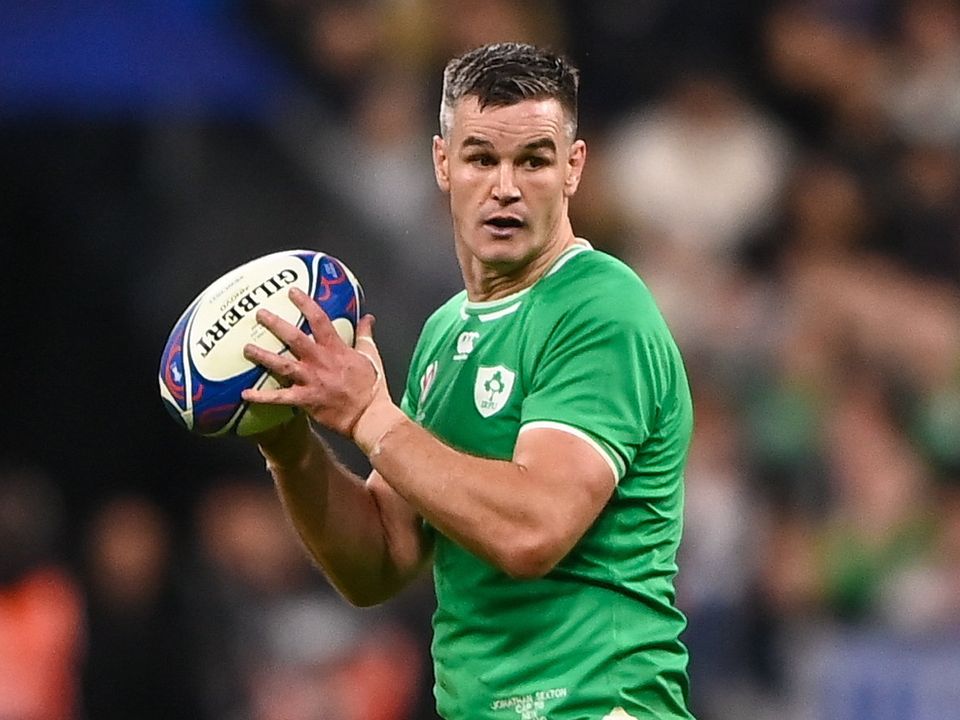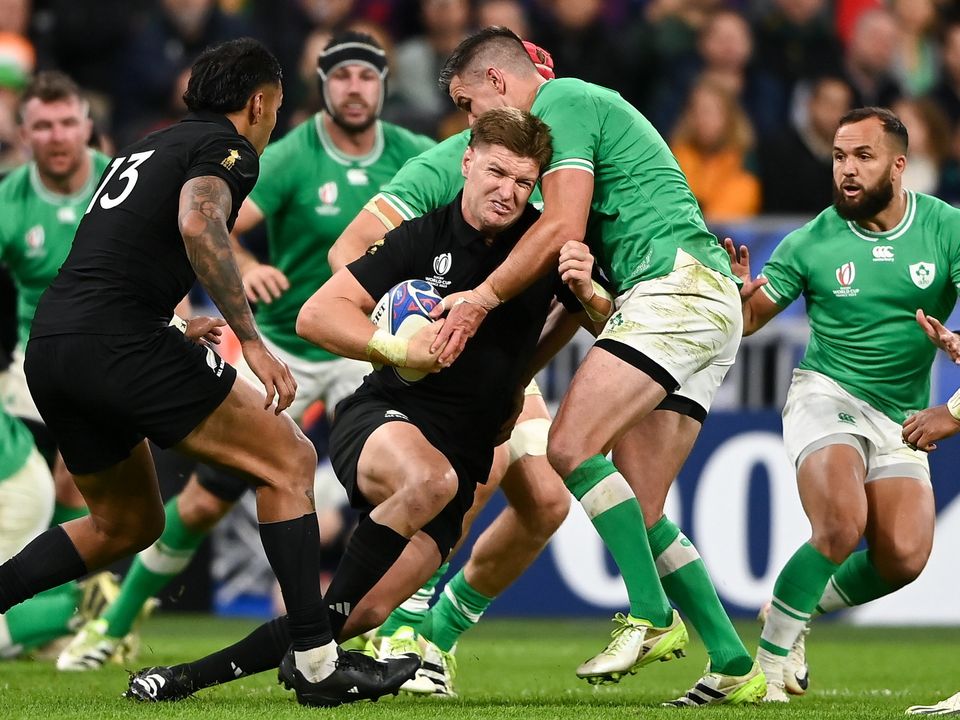Roy Curtis: Johnny Sexton left all black and blue at the end of the dream
Ireland’s captain was the kind of stirring figure so many would willingly follow into an inferno
The choreographer-in-chief has shaped his last dance, a conductor for the ages has laid down his baton, it is time for Ireland’s ancient condor to fold his great wings and rest.
For even his deepest admirers, the fear is that Johnny Sexton might struggle now to sleep easily.
What kind of emptiness will gnaw at the fierce obsessive’s intestines as he walks into the night, the thunder of combat giving way to the silent season of the hero?
Clubbing blows of fate cut short the extended essay of the 38-year-old’s playing career a fortnight earlier than he had projected and, for a man who has always raced hardest against himself, those lost 14 days might yet amount to a life sentence.
Even Sexton’s young son, Luca, seemed to grasp the implications of that failed Parisian last stand when, in a beautiful, teary post-match cameo, he offered Ireland’s drowning leader the life-raft of his filial love.
Johnny crossed a bridge few public figures get to traverse
The talismanic and celebrated out-half leaves in his wake a bulging catalogue of achievement, a rare treasury of memories.
Two Grand Slams, Three Triple Crowns, a quartet of European Cups, 119 caps, more than 1,100 international points, rugby’s equivalent of the Ballon d’Or ... Sexton has dined well at the table serving what the king of Gonzo, Hunter S Thompson, calls “the meal of life”.
Piled one atop the other, his achievements would dwarf the most leviathan lock forward.
Even those statistics, a dazzling aurora borealis of accomplishment though they are, do not tell the full story.
They are impotent to properly reveal Sexton’s emotional impact, the connective tissue that conjoined Irish rugby’s grandee both to fans of the game and – much more elusively – the broader public.
Johnny crossed a bridge few public figures get to traverse, the one that carries them to special terrain in a tribe’s heart.
He became, like Katie Taylor or Paul McGrath before him, someone about whom the nation fretted, putting down their prayer mats and offering novenas.
A measure of Ireland’s dreams.
Sexton made people care.
A statesman-footballer, beloved, an ambassador from a land of make-believe, the kind of inspirational and stirring figure so many would willingly follow into an inferno.
For all the human ballistic missiles and cannonballs, the lithe, streamlined panthers populating the Irish team, it was Sexton’s story that riveted the nation, that did most to carry this team beyond rugby’s relatively narrow parameters.
Sexton tackles Jordie Barrett during last weekend’s epic quarter-final
Read more
For the better part of 15 years, certainly since Brian O’Driscoll’s retirement a decade ago, he has been an essential part of the fabric of so many lives, a constant presence in water-cooler and high-stool conversations.
Certainty, in uncertain times, investing all of himself, defiant and fearless and inattentive to his personal safety as he stood in the path of huge rampaging opponents. Always wanting – needing – to squeeze out every last blob from the tube of self.
There he was, sailing through the confusion of a fevered contest in Twickenham or Auckland or Lansdowne Road, providing order and clarity in the storm.
Instantly developing the picture his mind had just snapped, seeing the game a full Polaroid ahead of anybody else, understanding the possibilities a few pixels before even the best of his peers.
At his best a blend of lethal precision and fearless adventure and white-hot desire, a storehouse of infinite wonder.
He was cranky and single-minded and unapologetic in his elemental urgency to coax the best from himself and those around him – teammates, coaches, and infamously, match officials.
One of those crazy dreamers who didn’t believe geography or history or unpromising odds should hold him back.
In his latter years, a listed building among the new glass cages, yet still regarding defeat as an enemy, an affront, a rebuke to his sense of self.
It is why even though his career was abundant in grace notes, it is all those discordant, out-of-tune World Cup experiences that, you suspect, will leave him bothered and unfulfilled.
Competitors as fanatical and neurotic as Sexton – the kind whose self-esteem seems to derive from events on a rectangle of grass – tend not to be reliable storehouses of perspective.
For all their glories, it is the database of misery and missed opportunity that consumes their every waking hour.
In this regard, Sexton is Roy Keane or Michael Jordan or Tiger Woods or Henry Shefflin or AP McCoy, but with a D4 accent.
The World Cup is the gold standard, the ultimate yardstick, the one that separates mortals from divinities.
Four times, Sexton set out on expeditions bound for the Olympus summit; four times, neither he nor his Irish teammates could find a way to advance beyond the foothills.
Last Saturday was to be the one when fate’s magical glitter – formed from shards of the at last smashed quarter-final glass ceiling – was to fall on the Dubliner like celebratory confetti.
Only for New Zealand – brilliant, ruthless, heroically impenetrable through 37 phases at the death – to deny the otherwise impeccable architecture of his sporting life its signature landmark.
It will be of precisely zero consolation to Sexton that the contest was titanic, a thunderous, unforgettable heavyweight clash, one that will endure beyond all our birthdays.
Ireland might not have choked, but neither did they win.
And for those forever chasing the rolling thunder of the conqueror, the distinction between the two is – in the short term at least – entirely meaningless.
In the mean streets where the obsessive plies his trade, consolation prizes are bogus currency, trinkets without value.
When it is distilled down to its brutal essence, Sexton was denied the high ground he has scrabbled towards all his life, the gates to serenity padlocked and impassable.
Many great athletes live in a kind of perpetual adolescence, their world view narrow and one-dimensional: Essentially, there is victory or there is a void.
Those who suggest it is only a game may, particularly given the dark tide of events engulfing the planet at this moment, be making an entirely reasonable point.
But reasonable is not a word in the vocabulary of the obsessive.
Such athletes are engrossed, often to a point of irrationally where it can corrupt emotional and mental well-being – by the pursuit of excellence.
And by winning.
Jonny Wilkinson, like Sexton a world class out-half consumed by his chosen code, shone a light on what it is like to inhabit that pitiless binary world of black and white, success or emptiness.
“When you’re obsessive, like me, searching for something unattainable can become unhealthy … it’s like falling through the air and grabbing at the clouds.”
Winning the 2003 World Cup with England at least opened some kind of a parachute for Wilkinson.
But Sexton, at the miserable conclusion of his final game as a professional, was a falling man without any apparent lifeline.
It was both lovely and deeply moving to see his young son immediately offer himself as a safety net.
As the music fades, the task for Ireland’s choreographer-in-chief is to accept that sometimes fate dictates how the dance – even the last dance – will unfold.
It might be his hardest battle yet.
















































